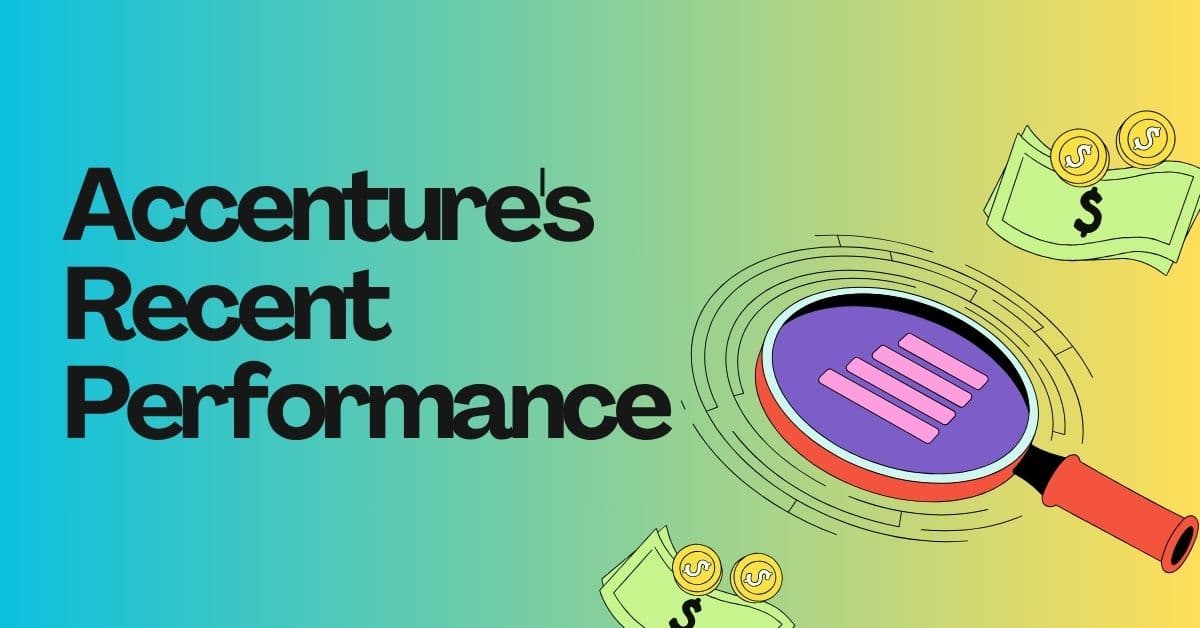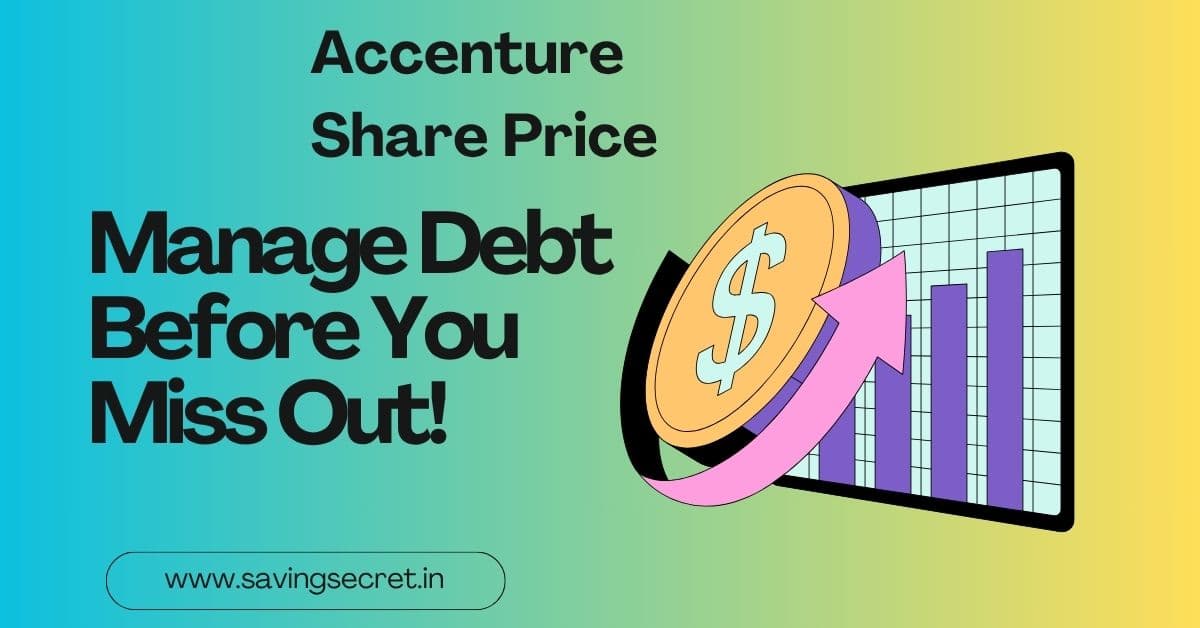Accenture Share Price (NYSE: ACN), a major player in the professional services industry worldwide, recently dropped, hitting about $291.58 on June 20, 2025, following its Q3 FY25 results release (BusinessWire). Accenture is a strong investment option for Indian investors due to its strong fundamentals, strategic focus on artificial intelligence (AI), and leadership in digital transformation, even in the face of this short-term volatility caused by a 6% drop in new bookings. The article explores the reasons for Accenture’s stock’s continued appeal, the significance of debt management in grabbing these kinds of chances, and doable strategies for smart investing in June 2025.
Accenture’s Recent Performance
Strong financial success was demonstrated in Accenture’s Q3 FY25 results, which covered March 1–May 31, 2025, however there were also issues that affected the company’s stock price. Important points to remember are:

- Revenue Growth: Compared to Q3 FY24, revenues increased 8% in US dollars and 7% in local currency to $17.73 billion (Accenture Newsroom).
- Earnings Per Share (EPS): EPS exceeded analyst projections of $3.29 by 15% year over year to $3.49 (Investopedia).
- Operating Income: According to BusinessWire, GAAP operating income increased 13% to $2.98 billion, indicating a robust rise of the margin.
- New Bookings: With $9.08 billion in consulting and $10.62 billion in managed services, the total new bookings came to $19.7 billion, a 6% decrease in US dollars and a 7% decrease in local currency (Accenture Newsroom).
The stock dropped over 5% to $291.58 on June 20, 2025, from a June 19 closing of $306.40, while exceeding revenue and EPS projections. This was mostly because of worries about the drop in new bookings (CNBC). Given that new bookings are a leading sign of demand, this decline implies that investors are being cautious about future revenue growth. However, some worries are allayed by Accenture’s $1.5 billion in generative AI bookings, which indicate strength in high-growth sectors.
| Financial Metric | Q3 FY25(Mar-May 2025) | Change YoY |
| Revenue | $17.73 billion | +18% |
| EPS | $3.49 | +15% |
| Operating Income | $2.98 billion | +13% |
| New Bookings | $19.7 billion | -6% |
| Generative AI Bookings | $1.5 billion | – |
The opinions of analysts are still divided. On June 16, 2025, JP Morgan increased its price goal to $353 while keeping its “Overweight” rating, whereas on June 12, 2025, Morgan Stanley reduced its target to $340 while retaining a “Equal-Weight” rating (GuruFocus). According to WallStreetZen, the average analyst price target is $380.83 by May 2026, which is a 20.28% increase from $316.62.
Accenture’s Long-Term Prospects

Accenture’s strategic investments in AI and leadership in digital transformation are key factors in its potential for long-term success. The business serves sectors including communications, financial services, health, and resources by offering a broad variety of services, such as systems integration, application management, security, data and AI, and automation (Yahoo Finance). With operations in more than 120 countries and a clientele that includes S&P 500 and S&P 100 corporations, its worldwide reach highlights its market leadership.
Strategic shift to AI
In order to provide AI-enabled solutions more quickly, Accenture announced a significant reorganisation on June 20, 2025, which will take effect on September 1, 2025. The company will combine its services under a single Reinvention Services unit (Accenture Newsroom). Manish Sharma is spearheading this initiative to establish Accenture as the premier AI-powered professional services company. With 69% of CEOs pointing to AI’s quick acceptance, the company’s Technology Vision 2025 emphasises AI’s contribution to organisational autonomy (Accenture Newsroom).
Growth in Industries with High Demand
Accenture’s emphasis on digital transformation, cloud computing, and artificial intelligence is in line with worldwide trends. Its capacity to land high-value contracts in cutting-edge technologies is demonstrated by its $1.5 billion in generative AI bookings in Q3 FY25. Furthermore, collaborations like the one with Kyoto University to promote research on human-centered AI strengthen its capacity for innovation (Yahoo Finance). Accenture’s appeal to ESG-conscious investors is further enhanced by its efforts in sustainability and innovative income streams (Accenture Insights).
Resilience in Finance
Accenture’s stable financial situation is demonstrated by its steady sales growth (7.7% in Q3 FY25) and robust free cash flow ($3.5 billion) (CNBCTV18). The firm expressed confidence in continued profitability by increasing its FY25 EPS projection from $12.55 to $12.79 to $12.77 to $12.89 (Barrons).
Why Manage Debt before Investing?
Excessive debt might make it more difficult for you to invest in prospects like Accenture, particularly when stock prices decline and present possible opportunities for purchases. For Indian investors, debt management is essential since high-interest credit card debt—which typically ranges from 20 to 40 percent per year—can reduce financial flexibility. This is why managing debt is important:

- Frees Up Capital: Debt reduction raises available funds for investments.
- Reduces Risk: During market downturns, having less debt eases financial hardship.
- Enhances Creditworthiness: If necessary, lower-rate loans can be obtained with a higher credit score.
- Optimises Returns: Compared to stock market profits (~10%), paying down high-interest debt (e.g., 20%) frequently results in a better effective return.
While investing while making regular payments may be feasible for low-interest debt, such as housing loans (7–9% in India), high-interest debt should take precedence.
Tips to Manage Debt
- Prioritise High-Interest Debt: Use the avalanche approach (highest interest rate first) to pay off high-interest credit card balances or personal loans first.
- Consolidate Debt: Use institutions like HDFC Bank to combine several debts into a single loan with a reduced interest rate.
- Follow the 50/30/20 Rule: You should set aside 50% of your income for necessities, 30% for desires, and 20% for investments, debt reduction, and savings.
- Avoid New Debt: Refrain from taking on more debt by using cash for non-essential expenditures and limiting needless borrowing.
- Seek Professional Advice: For debt management strategies, speak with a financial professional or make use of services such as Bajaj Finance.
| Debt Management Strategy | Action | Benefit |
| Pay High-Interest Debt | Clear credit card balances | Saves on interest costs |
| Budgeting | Use 50/30/20 rule | Balances debt and investments |
| Consolidate Debt | Combine loans at lower rate | Simplifies payments |
| Avoid New Debt | Pay Cash for purchases | Prevent debt accumulation |
| Professional Advice | Consult advisor | Personalized strategy |
How To Invest In Accenture
Take these actions to maximise Accenture’s potential:
- Create a Broking Account: Make use of websites such as Robinhood, Fidelity, or Zerodha (for U.S. equities through partnerships).
- Establish a Budget: Set aside 5–10% of your fund (for example, ₹35,000–₹70,000 for a ₹7 lakh fund) to purchase 1–3 shares for about $291.58 (₹24,500 at ₹84/USD).
- Employ Dollar-Cost Averaging: To lower volatility risk, invest a certain sum each month, such as ₹10,000 (INDmoney).
- Keep an eye on the technicals: MacroTrends suggests a rebound over $306.40 with support around $275.01.
- Speak with an advisor: Make sure your investments support your objectives, particularly for Indian investors handling currency conversion.
An Example from Real Life
The scenario: Arjun, a 35-year-old Bengaluru-based IT specialist, makes ₹1.5 lakh per month. He wishes to invest in Accenture and has ₹50,000 in credit card debt at a rate of 24% interest.
- Debt management: In order to pay off his credit card debt in around two years and save ₹12,000 a year in interest, Arjun sets aside ₹30,000 each month (20% of his salary).
- Investment Strategy: After paying off debt, he uses Groww’s SIP to invest ₹10,000 per month, purchasing about 0.4 shares at $291.58 each month. He has around five shares worth ₹1.22 lakh in a year, and if the stock rises to $380.83, he might profit by 20%.
- Result: Arjun positions himself for Accenture’s expansion by addressing his debt first, freeing up funds for investments without putting a hardship on his finances.
Frequently Asked Questions (FAQs)
What caused the recent decline in Accenture’s stock price?
Despite solid Q3 FY25 earnings, a 6% drop in new bookings ($19.7 billion) prompted questions about future revenue (Investopedia).
In June 2025, is Accenture a wise investment?
Driven by AI and digital transformation, analysts have a target price of $380.83 by May 2026, indicating a 20.28% upside (WallStreetZen).
In what ways can managing debt aid in investing?
Reducing high-interest debt reduces financial risk and frees up funds for investments.
What are the areas of growth for Accenture?
artificial intelligence, cloud computing, and digital transformation; in September 2025, a new Reinvention Services division will be introduced (Accenture Newsroom).
How may investors from India purchase Accenture stock?
When investing in U.S. equities, be sure to follow RBI requirements by using platforms such as INDmoney or Zerodha.
Conclusion
Accenture is a good option for Indian investors due to its solid fundamentals, leadership in AI, and strategic restructuring, even if its stock just fell to $291.58 after Q3 FY25 earnings. You can invest in chances like Accenture without experiencing financial difficulty by managing your debt well, which includes prioritising high-interest debt, consolidating loans, and creating a sensible budget. Analysts predict a 20.28% increase, so this could be the moment to take action. To make sure your investments support your objectives, open a broking account, make sensible financial allocations, and speak with a financial counsellor. Secure your financial future now to avoid missing out!
Disclaimer: Investing in the stock market is risky. Before making an investment, consult with a knowledgeable financial counsellor. This essay is just meant to be instructive.
ONGC Share Price Target Rising: Manage Debt Before You Invest!
Reliance Power Share: Boost or Block in Debt Management?
Sensex Share Bazar Today: Act Fast on Your Loan Burden
8th Pay Commission Expected Soon: Manage Your Loans Before It’s Too Late!
